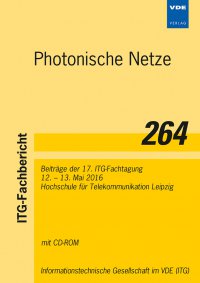Sustainability in Photonics – An Introduction
Konferenz: Photonische Netze - 17. ITG-Fachtagung
12.05.2016 - 13.05.2016 in Leipzig, Deutschland
Tagungsband: Photonische Netze
Seiten: 6Sprache: EnglischTyp: PDF
Persönliche VDE-Mitglieder erhalten auf diesen Artikel 10% Rabatt
Autoren:
Grobe, Klaus (ADVA Optical Networking SE, Fraunhoferstr. 9a, 82152 Martinsried, Germany)
Inhalt:
Sustainability has become a ubiquitous requirement, driven by global warming and resource scarcity. For photonics (and other telecommunications) equipment, the most-relevant related environmental aspects are in-service energy consumption (CO2), resources usage during production (raw material, energy, CO2), all transportation (CO2), and recycling potential. These aspects are analyzed in Life-Cycle Assessments (LCA) according to ISO14040/44. Environmental impact is not the only sector considered under the term Sustainability. A holistic view must cover all relevant aspects of the Triple Bottom Line – Planet, People, Profit – in order to allow sustainable growth. This adds corporate-related aspects like Corporate Social Responsibility (CSR), supply-chain management, or stakeholder engagement. It finally adds business concepts that lead to a paradigm shift away from the linear take-make-dispose model of selling and forgetting products toward Circular Economy (CE). CE is being heavily pushed in both, the US and the EU. Its inherent idea is the concept of optimized Reduction (of raw materials, energy, CO2), Reuse (of as many parts as possible), and Recycling (rather than downcycling, thus recovering as much raw material as possible). CE must be supported by related product ECO Design, business models (e.g., leasing, take-back), and optimized logistics. Many models and standards exist for the various aspects of Sustainability (including various ISO standards). Examples regarding energy efficiency include several TEER (Telecommunications Energy Efficiency Rating) documents. These are partially complementing or overlapping, and altogether too complex for practical use. QuEST Forum, the standardization body who developed telecommunications’ version of the Quality-Management standard ISO9001, TL9000, also developed a model that covers the different sustainability segments and allows both, relatively simple audits and self-assessment on all sustainability aspects. An introduction to this model is given.


